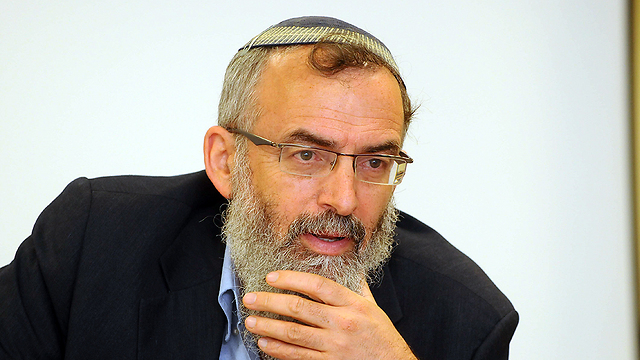
‘Israel already has civil marriage under the radar’
In a surprise move, religious-Zionist rabbis and movements are joining the call for the institutionalization of civil marriage in Israel, in a bid to solve the halachic problem of common-law marriage. ‘A normal state can’t afford a situation in which 10 to 20 percent of its citizens are unable to get married,' says Tzohar Rabbi David Stav.
The voices calling for the institutionalization of civil marriage in Israel usually come from non-Orthodox organizations and from representatives of immigrants from the former Soviet Union, who have involuntarily found themselves in the heart of the Israel’s “personal status” crisis. But now, a new force is joining the effort—and it comes, surprisingly, from the heart of the religious sector.
The Ne’emanei Torah Va’Avodah movement is launching a PR campaign in a bid to enlist the religious-Zionist public’s support for the move. Based on a halachic opinion from Rabbanit Nechama Barash, the organization aims to encourage the Religious Zionism movement to reconsider what has been perceived as a real taboo until now.
The religious people behind the move are concerned that the legal option of “common-law marriage,” which is being used by 6 percent of Jewish couples in Israel, is in fact civil marriage below the state’s radar. As this leads to halachic complexities, they would rather see the institutionalization of civil marriage in Israel as an official, recognized path.
“A normal state can’t afford a situation in which 10 to 20 percent of its citizens are unable to marry,” says Rabbi David Stav, head of the Tzohar rabbinical organization.
“A couple may be married in accordance with Jewish law, but it won’t necessarily bother to get divorced in accordance with Jewish law, and that leads to multiple cases of mamzerut (when children are born from forbidden relationships). If there was no religious marriage ceremony, there would less of a problem,” explains Rabbi Ilai Ofran.
“In addition to my religious values, my arsenal of values includes democratic values as well,” explains Rabbi Michael Avraham. “A state should let every couple live the way they see fit. Despite being a religious person, I wouldn’t want it any other way.”
“I believe an alternative path should be established for people who aren’t interested in getting married through the Rabbinate,” says Rabbi Yuval Cherlow.
Rabbi Avraham adds, “I think that, as a religious public, we must join the protest over this violation of civil rights.”
‘Religious public is ignorant about civil marriage’
Tani Frank, head of the Religion and State Department at Ne’emanei Torah Va’Avodah, says ignorance in the religious sector regarding civil marriage stems a misunderstanding of the problem. “When a young man wearing a skullcap arrives at the Religious Council, he won’t be required to undergo a ‘clarification of Judaism.’”
In Israel, he says, there are many couples who are can’t be married under Israeli law—and that’s in itself a good enough reason to try to come up with a fundamental solution to the problem.
“There are several types of groups and several problems,” he says. “There are those who are considered to have no religion, even though they actually feel Jewish and even practice different Jewish customs, but the state rejects them when they wish to convert.
“There is a group of people who are Jewish according to the Halakha but whose Jewishness is questioned, including immigrants from the former Soviet Union or from Ethiopia. The other group is comprised of seculars who aren’t interested in undergoing halachic religious practices, like bride training and ritual immersion, for a wedding. And finally, men and women who are refused a divorce, agunot (women chained to their marriage) and all other people who are halachically forbidden to marry.”
Rabbanit Nechama Barash picked up the halachic gauntlet. “Let’s start with the simpler cases,” she says, “of people who define themselves as Jews but aren’t recognized as Jews by the Halakha. In other words, they have no Jewish mother according to the Orthodox criteria, and they basically have no way of getting married here.
“A democracy like Israel can’t afford a situation in which hundreds of thousands of its citizens simply can’t get married. All the marriages in Israel are under the religious envelope, regardless of religion.
“The Spousal Covenant is only for couples in which both partners are officially defined as having no religious affiliation. It doesn’t apply to people who are halachically forbidden to marry, like a person considered a ‘mamzer’ according to Jewish law, a divorced woman who wants to marry a Kohen, or someone with no religious affiliation who wants to marry a Jew. They have no way of getting married here.
“The question is how to balance our status as a democracy with the desire to maintain traditional and Jewish values. It isn’t easy, but it’s impossible to impose a system which doesn’t serve all citizens of an entire state. We need a situation in which people come to religious marriage, like in the United States and Europe, from a place of choice. We have to build a civil system that is similar to the situation in other places with an option of civil marriage and divorce.”
How can this be solved halachically?
“From a halachic perspective, if one of the parties isn’t Jewish, there’s no issue of marriage according to Jewish law. The question is what happens if both partners are Jewish according to the Halakha and are interested in a civil marriage. Are they considered married according to Jewish law and will have to seek a ‘get’ (religious divorce) in case of a separation? Like in the entire Halakha, there is a dispute here, but the dominant halachic voice of the ‘poskim’ (those who rule in accordance with religious law) tends not to see civil marriage as a marriage ceremony. In other words, this isn’t a religious marriage, it has no halachic validity and there is therefore no need for a religious divorce.
“On the other hand, there is a minority opinion that asserts that a couple living together and establishing a joint family unit from a financial and sociological aspect is considered married and has to get a religious divorce. I personally identify with the minority approach and believe marriage is more from the halachic aspect, but I understand that most people feel differently. So I would rather take their opinion into consideration, as it allows couples to get divorced without a ‘get’ and reduces the number of ‘mamzerim.’ At the end of the day, I also identify with the opinion that religious marriage applies only after a very detailed and specific religious ceremony.”
According to Rabbanit Barash, in order to let the minority speak too, rabbinical courts demand a religious divorce even from couples who were married in a civil marriage. “But if the man or the woman refuse, they will dissolve the marriage without the ‘get,’” she says.
“We suggested expanding the Spousal Covenant and letting every couple decide on a civil path. The thing is it won’t be called ‘marriage’ then. On the other hand, it could be a solution granting full legal rights to all couples without the need for a religious divorce if the relationship ends.”
Barash stresses that the alternative civil path isn’t aimed at weakening the rabbinical establishment or sabotaging the halachic way of marriage, but rather at “giving couples a real choice to make their relationship official in a religious or civil way, whatever they decide, after all the options and their complexities are presented to them in full.
“But I would gladly push some of the courts aside,” she adds. “Some of them are doing a very good job, but they aren’t making a sufficient effort to solve things in a systemic way, and it takes too much time as it is, causing a lot of anguish. I wouldn’t want to cancel the rabbinical establishment, but I would like this to encourage them to rethink the issue. I think it’s important for the entire population to have a choice, because from a moral perspective I want people to be able to marry rather than live together in a state of helplessness over starting a family. If there is a choice, the religious system will have to work to make itself more attractive.”
‘Reality is stronger than anything’
So how can one enlist the religious public to a battle that allegedly has nothing to do with it? According to Frank, this battle is actually more relevant than ever to people who care about Jewish identity.
“We began dealing with the common-law issue after realizing that there are many people who, unlike us, believe the state’s Jewish identity is reflected in the Rabbinate’s monopoly over marriage and divorce, and that even when there are victims and there is a democratic and moral price, it is seen as a proportional violation of rights in the name of the importance of the state’s religious identity.
“We wanted to show that there are things happening that are very similar to the Shabbat situation. The public isn’t waiting for politicians and rabbis to provide options. There is an existing legal institution, which is one of Rabbi Yaacov Medan’s main motives to institutionalize civil marriage, and he talks about it in the Gavison-Medan Covenant. ‘Common-law marriage’ is a very problematic issue from a halachic perspective. There are religious couples, for example, who get married privately in a halachic marriage and no one knows who they are and what they are, and whether they even registered and where.
“If there was any proper registration, we would know that these are couples who got married in a halachic marriage and have to undergo a religious divorce process. At the moment, chaos is much bigger.
“I would like to tell all the opponents that there already is civil marriage under the radar. We have figures about a significant number of people who have found the way. It’s like saying, ‘We won’t allow public transportation on Shabbat,’ and then local councils offer private transportation because reality is stronger than anything.”
At the end of the day, you are pinning your hopes on Bayit Yehudi MKs, who have been leaving the religion and state issues to the Haredi parties for a long time now.
“That’s an important question, and there’s no clear answer,” says Tani Frank. “(Bayit Yehudi leader Naftali) Bennett, in my opinion, may be a product of this ignorance I’m talking about. In the previous term, when the Haredim were in the opposition and Bayit Yehudi had the Ministry of Religious Services, we didn’t see any improvement on this issue. But they did deal with issues on which there was less ignorance, like the conversion issue.
“I can tell you that when the Spousal Covenant issue made it to a Bayit Yehudi faction meeting, they brought Prof. Shahar Lifshitz and Rabbi Medan, and in the end Rabbi Haim Druckman pounded on the table and said, ‘It won’t happen.’ Both politicians and rabbis follow the public. Every congregation rabbi knows he shouldn’t say things that don’t receive a nod from the audience. So we have to make heads nod, and then rabbis and politicians will follow along.”




















